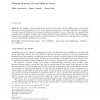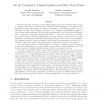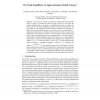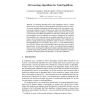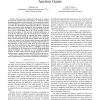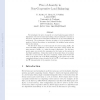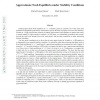113
click to vote
CORR
2011
Springer
14 years 8 months ago
2011
Springer
We determine the robust Nash equilibrium (RNE) for a wide range of problems in communications systems and networks that are faced with uncertainty in their parameters’ values. T...
127
click to vote
CORR
2010
Springer
14 years 10 months ago
2010
Springer
We consider the decentralized power allocation and spectrum sharing problem in multi-user, multichannel systems with strategic users. We present a mechanism/game form that has the...
125
Voted
WAOA
2010
Springer
14 years 11 months ago
2010
Springer
We consider cut games where players want to cut themselves off from different parts of a network. These games arise when players want to secure themselves from areas of potential i...
156
Voted
SIAMCOMP
2010
14 years 11 months ago
2010
We reexamine what it means to compute Nash equilibria and, more generally, what it means to compute a fixed point of a given Brouwer function, and we investigate the complexity o...
126
click to vote
SAGT
2010
Springer
14 years 11 months ago
2010
Springer
Abstract. One reason for wanting to compute an (approximate) Nash equilibrium of a game is to predict how players will play. However, if the game has multiple equilibria that are f...
104
click to vote
SAGT
2010
Springer
14 years 11 months ago
2010
Springer
Can learning algorithms find a Nash equilibrium? This is a natural question for several reasons. Learning algorithms resemble the behavior of players in many naturally arising gam...
MST
2010
14 years 11 months ago
2010
In this work, we continue the study of the many facets of the Fully Mixed Nash Equilibrium Conjecture, henceforth abbreviated as the FMNE Conjecture, in selfish routing for the s...
108
click to vote
INFOCOM
2010
IEEE
14 years 11 months ago
2010
IEEE
—We propose a virtualization framework to separate the network operator (NO) who focuses on wireless resource management and service providers (SP) who target distinct objectives...
117
click to vote
INFOCOM
2010
IEEE
14 years 11 months ago
2010
IEEE
We investigate the price of anarchy of a load balancing game with K dispatchers. The service rates and holding costs are assumed to depend on the server, and the service disciplin...
CORR
2010
Springer
14 years 11 months ago
2010
Springer
Finding approximate Nash equilibria in n × n bimatrix games is currently one of the main open problems in algorithmic game theory. Motivated in part by the lack of progress on wo...

